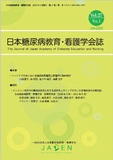Japanese
English
- 販売していません
- Abstract 文献概要
- 参考文献 Reference
- サイト内被引用 Cited by
目的:独居高齢糖尿病患者の運動療法の自己管理の取り組みおよび関連する要因を明らかにし,看護への示唆を得ることとした.
方法:70歳以上で外来通院中の独居糖尿病患者16名を対象に,半構成的面接法でデータ収集し質的に分析した.
結果:独居高齢糖尿病患者の運動療法の自己管理の取り組み程度は,少ない,中程度,多いの3段階に分類された.自己管理と関連する要因として,ソーシャルサポート,孤独感,生活の楽しみ,身体機能低下,自己管理の必要性の認識,生活への組み込み,負担感,取り組みの成果の8要因が抽出され,これらは関連し合っていた.なかでも生活の楽しみは,運動自体が生活の楽しみにつながる側面と,生活の楽しみが自己管理の取り組みに影響する側面があり,主要な要因であった.
結論:独居高齢糖尿病患者の運動療法の自己管理に関連する要因を考慮し,生活の楽しみが維持できるよう楽しみながら運動に取り組めるような支援,人との交流を促進し孤独感を軽減できるような支援が重要である.
Purpose: This study aimed to 1)determine the current scenario of exercise therapy self-management in elderly diabetic patients living alone and its influencing factors, and 2)offer suggestions regarding nursing interventions for effective self-management of exercise therapy.
Method: The participants were 16 type 2 diabetic outpatients, aged 70 years or older, living alone. Semi-structured interviews were conducted for data collection and qualitative data analyses were performed.
Results: The self-management approaches were classified as "Low," "Moderate," and "High." The 8 main factors associated with self-management extracted were social support, sense of isolation, life enjoyment, decline in physical function, awareness of the necessity of self-management, integration of self-management into their lives, feelings of burden, and results of self-management, which were all related to each other. Among them, life enjoyment was a major factor because exercise itself led to life enjoyment and life enjoyment influenced self-management efforts.
Conclusion: Considering the factors related to the self-management of exercise therapy in elderly diabetic patients living alone, it is important to provide support that enables them to enjoy exercise so that they can maintain enjoyment in their lives and interaction with others is promoted to reduce their sense of isolation.
Copyright © 2023, Japan Academy of Diabetes Education and Nursing. All rights reserved.


